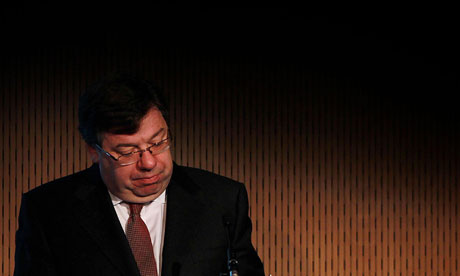Ireland fears civil unrest as bank crisis deepens
![]()
Trade union leader warns of riots if government imposes further ‘draconian’ cuts to public sector
Henry McDonald in Dublin and Andrew Clark

One of Ireland’s biggest trade unions warned today that the nation was on the brink of civil unrest as government officials negotiated a multibillion euro bailout for the country’s ailing banks.
The Technical Engineering and Electrical Union said further “draconian” public sector cuts of €15bn (£13bn) over four years could lead to street disorder. It urged a campaign of civil disobedience unless the taoiseach, Brian Cowen, calls an immediate election. An emergency cabinet tomorrow will discuss the new round of cuts.
“When the measures being proposed are heaped on top of the €14.5bn cuts already implemented in the last three brutal budgets, life in Ireland will be unbearable,” said the TEEU leader, Eamon Devoy. A group of 16 officials from the International Monetary Fund and European Central Bank are staying in Dublin’s luxury Merrion hotel, holding talks throughout the weekend with the Irish government and Ireland’s central bank. Financial sources told the Observer that a strategy could be announced as soon as Monday to stabilise Ireland’s banks.
A first priority is to restore confidence and halt an outflow of cash – Anglo Irish Banks revealed on Friday that customers have withdrawn €13bn of deposits this year. Measures under consideration include hiving off rotten loans into a freestanding “bad bank”.
An injection of capital into the banks could be followed by a broader sovereign bailout in the form of a multibillion euro “contingency loan” from the IMF and the ECB. Government sources said the loan would be available for Ireland to draw on if it ran out of money from the beginning of 2011. Asked about any preconditions that might be imposed, one senior source within the ruling Fianna Fail party said: “Because it’s a loan that we will have to pay back, they won’t be seeking anything major in return like higher corporation tax for Ireland.”
Ireland’s unusually low 12.5% rate of corporation tax, which has lured investment to the country by multinationals such as Google and Microsoft, is a bone of contention among European leaders. France’s president, Nicolas Sarkozy, today said he expected Ireland to increase the tax.
“There are two levers to use: spending and revenues,” he said at a Nato summit in Lisbon. “I cannot imagine that our Irish friends [would not use] this because they have a greater margin for manoeuvre than others, their taxes being lower than others.”
Ireland’s European allies fear that without swift action Ireland’s debt crisis could become contagious, weakening confidence in Greece, Portugal, Spain and in the euro as a currency. William Hague, Britain’s foreign secretary, expressed uncertainty about the future of the single currency – asked on the Today programme whether he felt the euro could collapse, he said: “I very much hope not. Who knows?”
David Begg, general secretary of the Irish Congress of Trade Unions, said the union movement was calling for mass protests on 27 November to “allow ordinary working people to voice their opposition to a policy that could destroy 90,000 more jobs”.
Related Articles
Salih Muslim: nuestro modelo es aplicable a todo el Medio Oriente
![]()
Salih Muslim es el co-Presidente del PYD (Partido de la Unión Democrática) junto a Asiah Abdullah, el principal partido de la autoproclamada región autónoma de Rojava, el Kurdistán sirio
German Intelligence Service is as Bad as the NSA
![]()
In recent weeks there has been much criticism of the US National Security Agency. It spies on people indiscriminately –
Somalia theatre suicide bombing kills top sports officials
![]()
Somali Olympics chief among at least 10 dead as al-Shabaab suicide bomber targets theatre while prime minister waited to deliver



